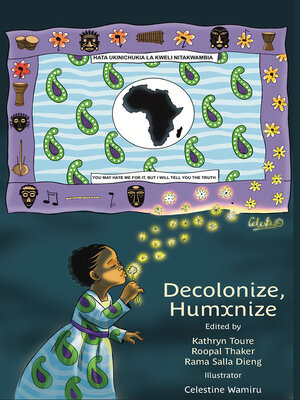
Sign up to save your library
With an OverDrive account, you can save your favorite libraries for at-a-glance information about availability. Find out more about OverDrive accounts.
Find this title in Libby, the library reading app by OverDrive.



Search for a digital library with this title
Title found at these libraries:
| Library Name | Distance |
|---|---|
| Loading... |
Whose knowledge counts? Why delve deep to understand self, history and intercontinental relations? How do people and communities heal from the wounds of colonization and related trauma passed from generation to generation? Such intractable questions are explored in this collection of essays on decolonization. To decolonize means to humxnize, which is of even greater urgency in the 21 st century with colonization showing itself in new forms. Perspectives from several continents suggest pathways toward more convivial and equitable relations in society, and each chapter is presented in conversation with an illustration. The book will inspire young leaders, educators, activists, policymakers, researchers, and anyone resisting colonization and its effects and working for a kinder, gentler world.
These 13 instructive and sometimes personal chapters speak to the urgency of decolonization, building on a culture of ubuntu or recognizing oneself in others.
– François-Joseph Azoh, Psychologist, Lecturer at Ecole Normale Supérieure of Abidjan, Cote d'Ivoire
Connections between colonization, racism, and other "isms" are addressed, as are rehumxnizing intercontinental movements such as Black Lives Matter, #MeToo, and #RhodesMustFall.
– Dr. Wanja Njuguna, Senior Lecturer, Journalism and Media Technology, Namibia University of Science and Technology
Embrace this read and learn how we humXns are the X-factor in the liberation from mental and physical bondage.
– Larry Lester, activist and President of the Greater Kansas City Black History Study Group, a branch of ASALH
Decolonization brings a progressive transformation of the world.
– Therese Mungah Shalo Tchombe, Emeritus Professor/Honorary Dean of Education, University of Buea, Cameroon







